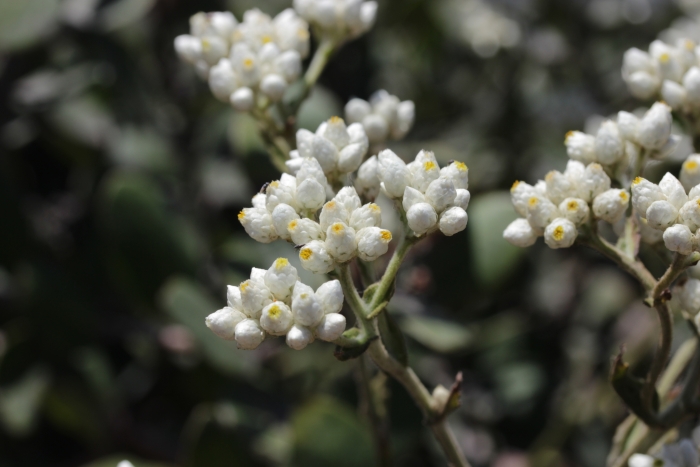California Everlasting
(Pseudognaphalium californicum)
California Everlasting (Pseudognaphalium californicum)
/
/

© bjoerns
CC BY-SA 4.0
Image By:
© bjoerns
Recorded By:
Copyright:
CC BY-SA 4.0
Copyright Notice:
Photo by: © bjoerns | License Type: CC BY-SA 4.0 | License URL: http://creativecommons.org/licenses/by-sa/4.0/ | Uploader: bjoerns | Publisher: iNaturalist |





































Estimated Native Range
Summary
Pseudognaphalium californicum, commonly known as California everlasting, is an annual or biennial herb that is native to coastal sage scrub and chaparral habitats along the west coast of North America, from Washington State to Baja California. It typically grows to a height of 8 to 31 inches (20 to 78 centimeters) and features branching stems with linear to lance-shaped leaves that emit a pleasant citrus aroma when crushed. The plant is characterized by its inflorescence, which consists of a cluster of small flower heads surrounded by bright white phyllaries that resemble petals, giving it a daisy-like appearance. The flowering season extends from summer to fall, and the flowers are quite showy, making it an attractive addition to native plant gardens.
California everlasting is valued for its drought tolerance and the charming white flowers that can brighten up dry landscapes. It is often used in native plant gardens, restoration projects, and as a filler in mixed borders. This plant prefers full sun to light shade and thrives in well-drained soils. It is relatively low maintenance and can be a good choice for xeriscaping. While the classification of this species has been debated, with some botanists placing it in the genus Gnaphalium, it is currently accepted under Pseudognaphalium. Gardeners should be aware that it can self-seed and spread if conditions are favorable, which might be considered invasive in some settings.CC BY-SA 4.0
California everlasting is valued for its drought tolerance and the charming white flowers that can brighten up dry landscapes. It is often used in native plant gardens, restoration projects, and as a filler in mixed borders. This plant prefers full sun to light shade and thrives in well-drained soils. It is relatively low maintenance and can be a good choice for xeriscaping. While the classification of this species has been debated, with some botanists placing it in the genus Gnaphalium, it is currently accepted under Pseudognaphalium. Gardeners should be aware that it can self-seed and spread if conditions are favorable, which might be considered invasive in some settings.CC BY-SA 4.0
Plant Description
- Plant Type: Herb
- Height: 0.5-3 feet
- Width: 1-2 feet
- Growth Rate: Moderate
- Flower Color: N/A
- Flowering Season: Spring, Summer, Fall
- Leaf Retention: Evergreen, Semi-deciduous
Growth Requirements
- Sun: Full Sun
- Water: Low, Medium
- Drainage: Fast, Medium, Slow
Common Uses
Butterfly Garden, Deer Resistant, Drought Tolerant, Low Maintenance
Natural Habitat
Native to coastal sage scrub and chaparral habitats along the west coast of North America
Other Names
Common Names: California Cudweed, Ladies’ Tobacco
Scientific Names: , Pseudognaphalium californicum, Gnaphalium californicum, Gnaphalium decurrens subsp. californicum, Gnaphalium decurrens var. californicum,
GBIF Accepted Name: